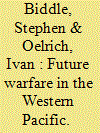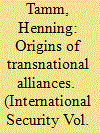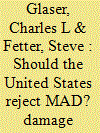|
|
|
Sort Order |
|
|
|
Items / Page
|
|
|
|
|
|
|
| Srl | Item |
| 1 |
ID:
147045


|
|
|
|
|
| Summary/Abstract |
Many analysts worry that improvements in Chinese missile, sensor, guidance, and other technologies will enable China to deny the U.S. military access to parts of the Western Pacific that the United States has long controlled. Although these “antiaccess, area denial” (A2/AD) capabilities are real, they are a geographically limited long-term threat. As both the United States and China deploy A2/AD capabilities, a new era will emerge in which the U.S. military no longer enjoys today's command of the global commons, but is still able to deny China military hegemony in the Western Pacific. In this new era, the United States will possess a sphere of influence around allied landmasses; China will maintain a sphere of influence over its own mainland; and a contested battlespace will cover much of the South and East China Seas wherein neither power enjoys wartime freedom of surface or air movement. This in turn suggests that the Chinese A2/AD threat to U.S. allies is real but more limited than often supposed. With astute U.S. choices, most U.S. allies in this new system will be imperfectly, but substantially, secure.
|
|
|
|
|
|
|
|
|
|
|
|
|
|
|
|
| 2 |
ID:
147047


|
|
|
|
|
| Summary/Abstract |
After a decade and a half of counterinsurgency operations in Iraq and Afghanistan, U.S. policymakers want to change their approach to COIN by providing aid and advice to local governments rather than directly intervening with U.S. forces. Both this strategy and U.S. counterinsurgency doctrine in general, however, do not acknowledge the difficulty of convincing clients to follow U.S. COIN prescriptions. The historical record suggests that, despite a shared aim of defeating an insurgency, the United States and its local partners have had significantly different goals, priorities, and interests with respect to the conduct of their counterinsurgency campaigns. Consequently, a key focus of attention in any future counterinsurgency assistance effort should be on shaping the client state's strategy and behavior. Although it is tempting to think that providing significant amounts of aid will generate the leverage necessary to affect a client's behavior and policies, the U.S. experience in assisting the government of El Salvador in that country's twelve-year civil war demonstrates that influence is more likely to flow from tight conditions on aid than from boundless generosity.
|
|
|
|
|
|
|
|
|
|
|
|
|
|
|
|
| 3 |
ID:
147048


|
|
|
|
|
| Summary/Abstract |
Despite their catastrophic proportions, the Congo Wars have received little attention from international relations scholars. At the heart of these conflicts were alliances between rebel groups and neighboring rulers. What are the origins of such transnational alliances, which have been a major feature of nearly all civil wars in post–Cold War Africa? Recent scholarship on external support for rebel groups does not offer a clear answer, either providing long lists of the goals that state sponsors may have or avoiding the question of motives altogether. A focus on political survival reveals that African rulers form alliances with rebels in nearby states to reduce the threats of rebellions and military coups that the rulers themselves face at home. Transnational alliances serve either to weaken a ruler's domestic enemies by undermining their foreign sponsors or to ensure the continued allegiance of key domestic supporters by providing them with opportunities for enrichment. Case studies of the alliance decisions made in the two Congo Wars by the rulers of Angola, Rwanda, Sudan, Uganda, and Zimbabwe show that their struggles for political survival account for why they sided either with their Congolese counterparts or with Congolese rebels.
|
|
|
|
|
|
|
|
|
|
|
|
|
|
|
|
| 4 |
ID:
147046


|
|
|
|
|
| Summary/Abstract |
As China invests in its nuclear forces and U.S.-China relations become increasingly strained, questions of U.S. nuclear doctrine require greater attention. The key strategic nuclear question facing the United States is whether to attempt to maintain and enhance its damage-limitation capability against China. The answer is less straightforward than it was during the Cold War, because China's nuclear force is orders of magnitude smaller than the Soviet force was. Part of the answer depends on the military-technical feasibility of the United States achieving a significant damage-limitation capability: What would be the outcome of military competition over the survivability of China's intercontinental ballistic missiles, submarine-launched ballistic missiles, and command and control, and over the effectiveness of U.S. ballistic missile defenses? The answer also depends on the benefits that a damage-limitation capability would provide; these could include contributions to homeland deterrence, extended deterrence, and reassurance of U.S. regional allies. The final piece of the analysis concerns the potential costs of a damage-limitation capability, which could include increased escalatory pressures during crises and growing political tension between the United States and China. A thorough analysis demonstrates that the United States should forgo such a capability because the prospects for preserving a significant damage-limitation capability are poor; the deterrent benefits would be small; and the escalatory and political costs would be relatively large.
|
|
|
|
|
|
|
|
|
|
|
|
|
|
|
|
|
|
|
|
|